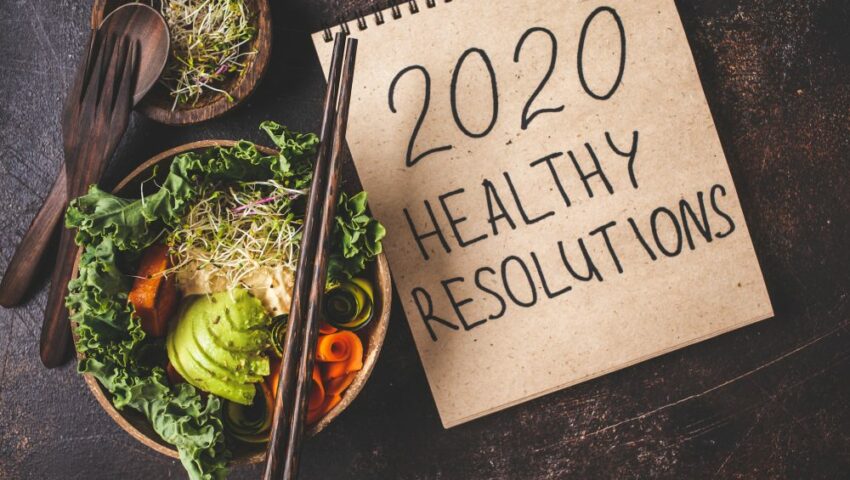Blogs
nutrition and wellness trends

2020 brings with it a new year and a new decade. For me, this means a new year of nutrition and wellness trends. January is the month for health and fitness, over-ambitious resolutions, and a host of new products that flood the market.
In the first month of 2020, we’ve already seen watermelon dehydrated, sliced, seared and served hot as a replacement for tuna (1). As well as the return of vegan versions of sausage rolls and new additions of vegan croissants, steaks and meatless meatballs. Equally, it probably hasn’t escaped your notice that some of the country’s largest fast-food chains have released many vegan options. Veganuary is getting bigger and bigger, with 250,310 participants recorded in 2019 (2) as well as a growing list of sponsors and celebrity ambassadors.
January also sees the resurrection of the ever-popular ‘detox’ diet. This particular diet craze comes with the proposed benefits of rapid weight loss, improvements in our digestion, hair, skin, nails, and energy levels. Although this idea seems wonderful, sadly it is based on pseudoscience, as our bodies (thankfully) have the capability to remove toxins themselves through the liver and kidneys.
It can sometimes feel like it’s difficult to keep your head above water when it comes to wellness trends. So here is a quick round-up of last year’s most popular talking points.
-
The Intravenous vitamin drip
Popularised by many celebrities and influencers, 2019 saw an increase in the #AD’s that were promoting intravenous vitamin drips, available at your convenience in shopping centres and airports, or even in your own home. Many health professionals have loudly spoken out about the risks of using these drips, particularly after some high-profile celebrities were taken to hospital after a bad reaction. Indeed, an article published earlier this year highlighted how the infusion of vitamins can potentially put the liver and kidney under great stress and is something that would only be considered in a clinical setting after screening, as well as a full medical history being taken (3). It’s safe to say, that the easiest way to get a good variety of vitamins is by eating a balanced diet, rather than an IV drip!
-
The Keto Diet
The Keto diet was first developed to treat children with epilepsy in a clinical setting, but within the last few years has become more and more popular in the media. Keto, with currently around 15 million tags on Instagram (4), is one of the biggest diet trends of 2019. The diet is characterised by a reduction in carbohydrates and a relative increase in the proportions of fat, with a moderate amount of protein. Typically, consuming high amounts of foods such as meat, fish, eggs, cheese, cream, oil, butter, nuts and seeds. Whereas, you avoid or heavily restrict wheat and other grains, potatoes, corn, pulses, beans, milk, most fruits and sugar. Carbohydrates are our main source of energy in the body, so when we are deprived of this, in a keto diet, we use fat as our energy source. Low carbohydrate diets have been around for a long time, under a host of different names, the idea is that the reduction of carbohydrates and overall energy will aid in weight loss. Anecdotally, many people have reported great things on the keto diet, such as quick weight loss as well as feeling fuller and more alert. There is ongoing research into this area looking particularly as a potential for weight loss and other health conditions such as diabetes. However, when looking at this diet overall there are a few things to note;
- It is food restrictive, by removing carbohydrates it is no longer balanced and can lead to nutrient deficiencies (5). The restrictive nature of this diet is also another reason why this is also incredibly challenging for a lot of people as it is such a dramatic shift in eating pattern.
- In the initial stages, something known as the Keto flu is often reported this includes headache, fatigue, nausea and an upset stomach (6),
- The long term effects on the general population are not well understood. This diet has been used in a clinical setting for a long time but is not well studied outside of this.
- Regardless of what you’re eating a calorie is still a calorie. Fat is the most energy-dense macronutrient, at 9kcal per gram, compared to 4kcal per gram for carbohydrates.
There is much debate about which diet is the optimal one for weight loss, while the answer to this question remains elusive, there are a few important factors to consider. These include the overall energy balance (calories in vs calories out), setting realistic goal, considering whether it is something you can actually stick to, and equally if you can maintain the weight loss long-term. It is clear from research into this area that the best diet is the one that fulfils these factors and is specifically tailored to you.
-
Celery juice
No one food can cure all of your ailments, but in 2019 celery juice certainly claimed to. According to a medical medium, celery juice is ‘one of the greatest healing tonics of all time’(7). The source of the bountiful healing properties is unclear as he quotes ‘the spirit’ as to where he first heard of celery’s healing properties. A book on the topic was also released in 2015 with ever-growing interest the trend has gone from strength to strength. The juice itself does have a few positives as it contains some vitamins but equally, as with any juice, a lot of the fibre has been removed in the processing. Most importantly to note is that no one food can cure all ailments, a more sensible approach would be to eat plenty of whole veg as well as plenty of water.
-
Personalised nutrition
We all have a personalised nutritional response, i.e how we break down and use food. A large scale research group published the first of its research into this area in 2019 which looked at 1000 individuals’ responses to different foods (8). They concluded that the ‘one size fits all’ nutritional guidelines to be potentially problematic based on the large variation in metabolic response when identical meals were eaten.
Equally, DNA testing kits, which claim to give you a personalised view of how your genes may be affecting or be affected by what you eat also became big business in 2019. At the end of the year, Waitrose (9) trialled a ‘DNA pop-up service’ in one of their major London stores. The service takes an ‘on-the-spot’ cheek swab which then offers a personalised DNA report, this data can be accessed via an app or wrist-worn band. Which, conveniently, you can then use to scan products in-store to make purchasing decisions. The science of personalised nutrition is in its infancy, so although interesting, these quick and easy tests are unlikely to give us any great level of detail, as of yet, into how our genes influence how we respond to food or how the food we eat affects our genes.
-
The downfall of diet pills, tea-toxes and appetite suppressants.
Tea-toxes involve drinking specific types of herbal teas throughout the day, which claim to ‘detox’ the body. Throughout 2019 concerns were raised by multiple professionals and high-profile figures about the potential dangers of these products. A lot of these claims have been very loudly and publicly de-bunked by experts in their area. As well as being expensive, and potentially harmful, these kinds of products tend to target individuals that are dissatisfied with their bodies.
It certainly feels to me that our interest in wellness and diet trends is waning, as more and more products launch and trends emerge it can be difficult to sort fact from fiction. With all this in mind when reading about trends there are a few things to look out for (10) to spot bad dietary advice.
- Does it sound too good to be true? Something that offers magical quick fixes or one product that promises to cure or remedy ill-health.
- Is it something which suggests rapid weight loss?
- Does it remove a whole food group, lots of popular diets advise eating one or two types of food or avoiding whole food groups altogether?
- Is it endorsed by celebrities?
Many articles have already sprung up predicting 2020’s top trends. Currently, these centre on alcohol-free drinks, sustainability (particularly of fish) and diversifying of plant proteins. After the year we’ve had and with all this in mind, there a few trends I’d like to see continue into 2020.
- Being a conscious consumer – Something bartlett mitchell is very passionate about is our environmental impact. At an individual level it can feel overwhelming when it comes to making environmentally friendly choices, 2019 saw more and more of us making a more conscious decision about things we’re doing, eating or buying.
- Dietary sustainability – Be it in the form of misshapen fruit and veg, eating more seasonably or taking active steps to reduce food waste. This area is something that is being talked about a lot, with more research focusing on how or what we eat and grow effects the environment. It’s a contentious area of discussion with lots of differing viewpoints. It will only move up the agenda as we move forward.
- Non-diet nutrition, intuitive eating and health at every size – Intuitive eating refers to eating in accordance with your own physical and psychological needs, paying attention to your hunger and fullness cues, what you enjoy eating and how it makes you feel in terms of your energy and wellbeing. This may strike you as contradictory to a lot that you may have read in terms of diet and nutrition which seems to revolve around food restriction and weight loss. However, this approach has a growing body of research behind it, and if you haven’t heard of it yet you probably will soon.
References
- Gallagher S. Wagamama launches Vegan ‘tuna’ made from watermelon, but it costs £13. Independent. 2020.
Available from: https://www.independent.co.uk/life-style/food-and-drink/wagamama-vegan-tuna-watermelon-veganuary-a9267646.html
- Veganuary 2019: The Results are In! 2019.
Available from: https://uk.veganuary.com/blog/veganuary-2019-the-results-are-in
- Chong E. Is it really worth injecting vitamins? BBC News. 2019
Available from: https://www.bbc.co.uk/news/health-47803286
- #keto hashtag on Instagram • Photos and Videos. Instagram.com. 2020.
Available from: https://www.instagram.com/explore/tags/keto/
- Kossoff E, Zupec-Kania B, Auvin S, Ballaban-Gil K, Christina Bergqvist A, Blackford R et al. Optimal clinical management of children receiving dietary therapies for epilepsy: Updated recommendations of the International Ketogenic Diet Study Group. Epilepsia Open. 2018;3(2):175-192.
- Masood W, Uppaluri K. Ketogenic Diet. Treasure Island (FL): Stat Pearls Publishing; 2019.
- The Medical Medium on the Virtues of Celery Juice. Goop. 2015.
Available from: https://goop.com/wellness/health/the-medical-medium-on-the-virtues-of-celery-juice/
- Berry S, Valdes A, Davies R, Delahanty L, Drew D, Chan A et al. Predicting Personal Metabolic Responses to Food Using Multi-omics Machine Learning in over 1000 Twins and Singletons from the UK and US: The PREDICT I Study (OR31-01-19). Current Developments in Nutrition. 2019;3(Supplement_1).
- Devlin E. Waitrose trials DNA-based food advice service in London store. The Grocer. 2019.
Available from: https://www.thegrocer.co.uk/store-design/waitrose-trials-dna-based-food-advice-service-in-london-store/599997.article
- Fad Diets. Bda.uk.com. 2020.
Available from: https://www.bda.uk.com/foodfacts/fad_diets




